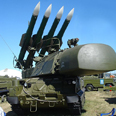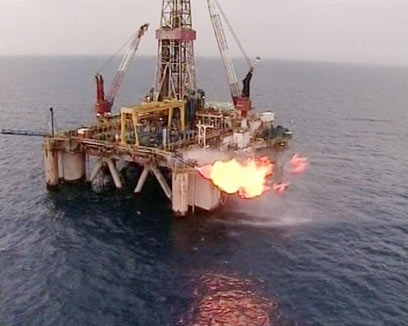
Hezbollah threat: Missile attacks on navy bases, gas rigs
Israel fears Syrian chemical weapons may reach Hezbollah, but Shiite terror group has its eye on conventional weapons that can change balance of power, undermine IDF's aerial superiority in Lebanon
While Israel fears that Syrian WMDs may end up in Hezbollah's hands, Bashar Assad is continuing to acquire lethal conventional weapons despite the civil war raging in his country.
Related articles:
- Iron Dome batteries deployed in north Israel
- Analysis: Israel's red line
- Syria: Hezbollah sets up camps near WMD sites
The Syrian president has paid $2-3 billion on military equipment in what the IDF defined as Syria's largest arms deal since the Yom Kippur War.

Scud launched by Syrian army against rebels
Israel fears that the balance of power between Hezbollah and the Jewish state will change dramatically should Syria's weapons reach the Lebanese Shiite group. Such a development may threaten Israel's aerial superiority in Lebanon's airspace, the IDF fears.
In this situation, the 60,000 missiles and rockets Hezbollah has already smuggled into Lebanon will be the least of Israel's concerns should a third Lebanon war break out. The transfer of advanced Syrian military equipment, such as radars, to Hezbollah may ignite the region and lead to an Israeli strike.

Gas rig of Haifa coast (Photo: Reuters)
Syria has purchased from Russia advanced surface-to-air missile systems, such as the SA-15, SA-17 and SA-22. The S-17 missile is capable of hitting planes flying at low altitudes.
With North Korea's assistance, Assad's regime developed the Scud-D missile, an improved version of the Scud-C. Syria claims it developed the Scud-D in the 1990s. Syria purchased hundreds of Scud-B (the original version) surface-to-surface missiles in the 1970s. According to the Syrians, the Scud-D has a range of up to 750 kilometers (466 miles), meaning it can hit almost anywhere inside Israel. The missile can carry some 1,000 kilos (about 2,200 pounds) of explosives. Theoretically, it can be armed with chemical agents. It is estimated that Syria possesses between 300 and 500 of these missiles.

Damage caused by Scud that hit Ramat-Gan in 1991 (Photo: Shaul Golan)
About a year ago Syria purchased from Russia "Yakhont" anti-ship missiles, which have a 300-kilometer (186 miles) range, meaning they can strike ships docking at Haifa Port, the nearby Navy base, as well as Israeli gas rigs in the Mediterranean Sea. Hezbollah has used these missiles in the past.
Yiftah Shafir of the Jaffee Center for Strategic Studies at Tel Aviv University told Ynet, "In 2006 we saw that Hezbollah was an army like any other, with strong and weak spots. It does not have tanks, for instance, and it is doubtful it will want Syrian tanks. I suppose it still wants Syria to supply it with rockets and anti-aircraft missiles. Downing an Israeli plane with the SA-17 anti-aircraft missile system would be a victory for Hezbollah's propaganda, but this system is very difficult to operate. I assume they will prefer smaller anti-aircraft systems – such as the SA-8. These missiles can be loaded onto a truck and are fairly easy to operate."
Israel fears that some of these weapons will end up not only in Hezbollah's hands, but in the hands of Global Jihad elements linked to al-Qaeda.
Israel Defense Prize laureate Uzi Rubin told Ynet that Hezbollah is a "state-like organization that operates as an extension of Iran. As far as I know, Syria's weapons-storage warehouses were open to Hezbollah even before the civil war. The Syrians have factories that manufacture rockets and missiles, and it will be very bad if al-Qaeda operatives will get their hands on them.
Meanwhile, the Institute for National Security Studies reported that the Russian navy has been holding training exercises in recent days off the Syrian coast in the Mediterranean. It remains unclear what the drill's objectives are.
- Follow Ynetnews on Facebook and Twitter
- Receive Ynetnews updates directly to your desktop










